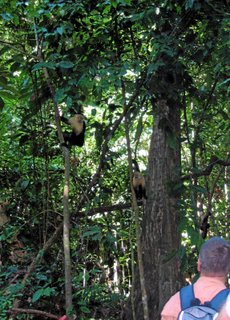 photos by Runningwave from her vacation in Costa Rica, February 2006.
photos by Runningwave from her vacation in Costa Rica, February 2006.
From: Webster.com
Main Entry: jun·gle
Pronunciation: 'j&[ng]-g&l
Function: noun
Usage: often attributive
Etymology: Hindi jangal forest, from Sanskrit jangala desert region
1 a : an impenetrable thicket or tangled mass of tropical vegetation b : a tract overgrown with thickets or masses of vegetation
2 : a hobo camp
3 a (1) : a confused or disordered mass of objects : JUMBLE (2) : something that baffles or frustrates by its tangled or complex character : MAZE
Jungle is a word that has very specific connotations to people who grew up in the Western countries of North America and Europe. Jungle is often something "other" to the world we use to describe our orderly, clockwork society: civilization. I find it interesting that Webster's Dictionary list the etymology of the word from Hindu simply meaning "forest." For indeed when I encountered "the jungle" for the first time twelve days ago in Costa Rica, I found it to be simply that: a forest. A tropical rain forest to be precise, yes, but "the jungle" doesn't look all that different up close as some of the forests of my home country. Different and more diverse plants, certainly. Animals of every size and description that were new to me, absolutely. But I wonder if monkeys howling or barking in the trees seem as wild to a Costa Rican native as it did to me? (See the photos of Capuchin and Howler Monkeys I took on the trip above.) Afteall, I have actually seen tourists oo-and-aaah at and then photograph deer in National Parks in the U.S., where I don't view deer as "wildlife" any more since they are so common in Maryland suburbs like squirrels or raccoons.
So the jungle is a bit less mystifying for me now than it once was. In my childhood, I love reading stories about jungles in India and other parts of southeast Asia and in the Americas. I enjoyed Rudyard Kipling's tales and dreamed of becoming an intrepid explorer. One of my favorite stories in English class was Richard Connell's "The Most Dangerous Game," about a big game hunter who becomes the hunted. I reveled in film versions of H. Rider Haggard novels like She and King Solomon's Mines and cinematic and literary images of Sir Arthur Conan Doyle's Lost World.
While on my vacation to the rain forests of Costa Rica, I took along a wonderful book entitled Latitude Zero: Tales of the Equator by Gianni Guadalupi. The book divides the narratives of equatorial exploration and conquest by "temperate zone" Westerners by continent and relates the successful and disastrous adventures of explorers from the 15th century through to the Victorians and Edwardians. This reading helped me to frame my own travel with the fantasies I have always had about exploring the unknown. I found myself intrigued and amazed by what the explorers encountered and saddened by the terrible costs in human life and in deforestation that often occurred while these places were forcibly opened to the West.
Yet there is something cathartic about separating the childhood dreams and dark illusions of youth from the real, living and breathing tropics. For me, the treks we made into the jungle opened my mind to the tremendous fertility of the planet, if only we will preserve what's left of these wild spaces. Spending ten days fording rivers; powerboating down canals; elevating ourselves into the forest canopy on a sling; whitewater rafting; and hiking in different microclimates brought us to places where we could encounter all sorts of animals that I found exciting and unusual: from macaws, to lizards, to orb weaver spiders, to troops of coatis (rain forest raccoons), to an anteater, to sloths and to monkeys.
We were able to fly over mountains in small planes to get from the capital of San Jose to the isolated National Parks on the Pacific and Caribbeann coasts and to drive through the mountainous central areas of this tiny tropical nation. Small it may be in land mass but, oh, how much of the wilderness is left in this beautiful country since some Costa Ricans had the foresight to protect what natural resources remain beginning in the 1970s.
I am still not a great fan of the combination of heat and humidity impacting on climate (cool, dry weather for me, when I can get it!), but I am so glad I bore the weather to take this trip, opening up a whole new world for me. I don't think I will ever understand the word jungle in quite the same way.